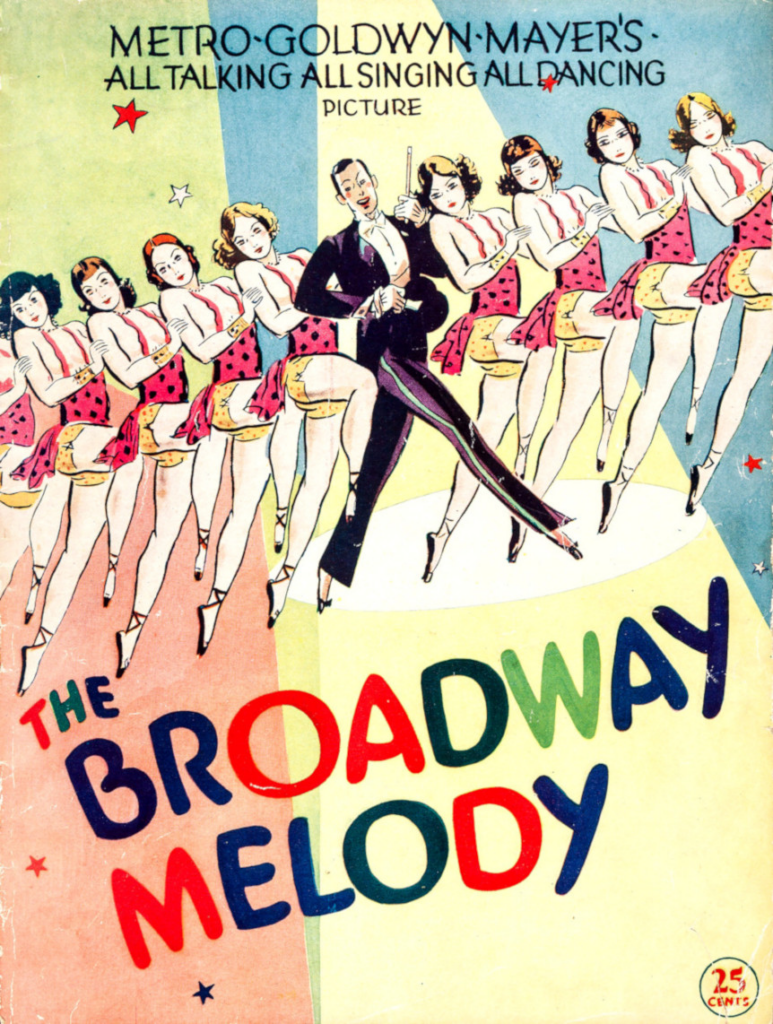
BROADWAY MELODY, THE(director: Harry Beaumont; screenwriters: story by Edmund Goulding/Norman Houston/James Gleason; cinematographer: John Arnold; editor: William LeVanway; music: Nacio Herb Brown/Arthur Freed; cast: Charles King (Eddie Kearns), Anita Page (Queenie Mahoney), Bessie Love (Hank Mahoney), Jed Prouty (Uncle Jed), Kenneth Thomson (Jock Warriner), Mary Doran (Flo), Drew Demarest (Turpe, costumer), Eddie Kane (Francis Zanfield); Runtime: 102; MPAA Rating: NR; producer: Irving Thalberg; MGM; 1929)
“The first musical and sound film to win an Academy Award for Best Picture creaks from old age.”
Reviewed by Dennis Schwartz
The first musical and sound film to win an Academy Award for Best Picture creaks from old age, wooden acting and a trite story written by Norman Houston and James Gleason; it’s based on a story by Edmund Goulding. Despite these severe flaws, it nevertheless is a landmark backstage musical that began the winning formula for the movie musical (one movie magazine reported that “in 1929 alone no fewer than seventy-five musicals were released”) and worked out some of the techniques on how to film it (such as performers lip-synching to pre-recorded sounds and better ways to record sound); the film had a budget of $350,000 and earned over four million dollars. The now familiar clichéd plot, new at the time, has two chorus girls trying to fulfill their dreams of stardom on the Broadway stage.
For comic relief it has the obvious gay character of the show as a design costumer, who is played as a stereotype by Drew Demarest. He’s thought of as some one who if he had his way, one character suggests, would paint the doors lavender. The effete character is accepted by the performers as the resident fruitcake to be laughed at but, on the other hand, is never treated with total condemnation. It’s of interest to see how Hollywood treated gays early on and to take note of how things evolved, as the movies gave voice to how they thought the public should treat gays.
The winning team of Arthur Freed & Nacio Herb Brown, in their first of many collaborations, provide the following classic songs “The Broadway Melody,” “You Were Meant For Me” & “The Wedding of the Painted Doll.” In this outdated curio, director Harry Beaumont (“Children of Pleasure”/”Our Dancing Daughters”/”Maisie Goes to Reno”) tries hard to keep up with the advancing technology, which was happening as the film was in progress. This original 1929 version was remade in 1940 as Two Girls on Broadway.
The Midwestern sister song-and-dance act of The Mahoney Sisters –the younger and more attractive Queenie (Anita Page) and the business-minded and more volatile older sister Hank (Bessie Love)– arrive in New York to try to make it big on the Great White Way. Hank’s smalltime song-and-dance man boyfriend Eddie (Charles King), who is from their same small town, has promised the gals a part in the new Broadway revue by impresario Francis Zanfield (Eddie Kane), an obvious takeoff on Flo Ziegfeld, in which he is to sing on the show the title song Broadway Melody he composed for it. After Eddie smooches with Hank, he’s pleasantly surprised at the way Queenie has developed since the last time they met. There’s a mutual attraction, but the loyal Queenie doesn’t want to steal her sister’s boyfriend even though Eddie tells her he wrote “You Were Meant For Me” just for her. To keep Eddie from chasing her, Queenie dates one of the show’s backers, lecherous playboy, Jock Warriner (Kenneth Thomson), an obvious takeoff on Jack Warner. Hank figures out that her Eddie loves her sis and gets a showbiz replacement for her sister act, Flo (Mary Doran), and moves on to live with her stuttering agent Uncle Jed (Jed Prouty) on Long Island. In the end, Hank accepts secondary slot bookings for vaudeville shows while sis gets hitched to Eddie and they become Broadway headliners.
REVIEWED ON 3/11/2008 GRADE: C+
Dennis Schwartz: “Ozus’ World Movie Reviews”
© ALL RIGHTS RESERVED DENNIS SCHWARTZ